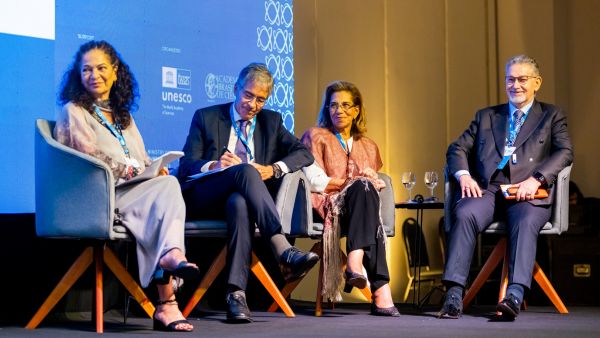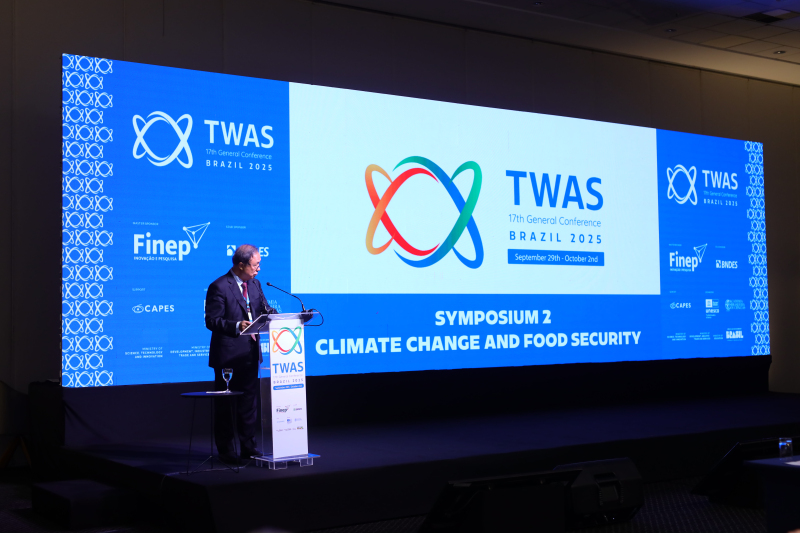The first half of the 17th TWAS General Conference drew from the Academy’s rich history and unique dual-position as a global Academy and voice for developing world science to set the stage for key discussions on major issues in science today.
This year’s Conference is in Rio de Janeiro, Brazil. The event focuses on how science, technology, and innovation can be leveraged to advance sustainable development globally, and organizes presentations and panels featuring some of the most high-level scientific experts from throughout the global South. The Conference is organized in partnership by the Brazilian Academy of Sciences (BAS) and TWAS.
During the opening ceremony, the over 300 attendees, most of them leading scientists from all over the world, heard welcome addresses from leading officials in TWAS and Brazilian science, topped by statements from Brazilian President Luiz Inácio Lula da Silva and the Brazilian Minister of Science, Technology, and Innovation Luciana Santos, who offered stirring messages in favor of science for sustainable development.
After the ceremony, attendees heard a special session on trends and perspectives on science in the global South, focused on the state of science in low- and middle- income countries and the Sustainable Development Goals’ role in the changing geography of research. This was followed by a keynote lecture by Karin Herrera, the vice-president of Guatemala. Herrera is a Guatemalan chemist and academic who assumed her current position in January 2024, and built a scientific career on fungi and environmental studies, later earning a PhD in political science and sociology.

“Today, more than ever, we need to have efforts among governments, academia, the private sector, civic society, and international corporations so that science innovation and technology become drivers of progress and transformation,” said Herrera.
The first day ended on an acknowledgement of TWAS’s 40th Anniversary, featuring remarks from many dignitaries and leadership figures who had played a part in making the Academy what it is today. It also included touching tributes to TWAS Founder Abdus Salam, and former TWAS Presidents José I. Vargas and Jacob Palis, both of Brazil and both of whom passed away in 2025. The session also featured Ron Leger, former programme director for the Canadian International Development Agency (CIDA). The anniversary event also presented a new book celebrating 40 years of supporting science in the developing world titled: “TWAS in the New Millennium: Building scientific capacity in a time of promise and peril”.
Day 2
The second of the event included an induction ceremony for all of the TWAS Fellows inducted into the Academy from 2023 to 2025. But it also included two major symposiums on some of the most major challenges faced by science today: The ethics of artificial intelligence, and the effects of climate change on food security.

The symposium on artificial intelligence involved such challenging questions as the impact of governments leveraging AI at a time when regulations are needed, rules for research institutions, the unreliability of large language models when it comes to conveying factual information, and the role philosophical ideas must play as scientists determine how the technology affects their work.
of the United Nations, South Africa (TWAS Fellow). (Photo: Mario Marques)
One panellist, Tshilidzi Marwala of South Africa, rector of the United Nations University in Japan and under-secretary-general of the United Nations, said that ethical frameworks from artificial intelligence must be derived from the Universal Declaration of Human Rights as policymakers work through the difficult ethical questions that can sometimes involve trade-offs.
“AI must be transparent, it must be secure; but what people don’t tell you is that transparency actually comes at the expense of security,” Marwala offered as an example. “If you make it transparent, it is less secure. And how much transparency you want to sacrifice for security actually becomes a value problem.”
The second symposium focused on the connections between climate change and food security, included an in-depth look at how climate change is endangering the Amazon rain forest, which is experiencing four times as many droughts as it was in the 1990s. It also examined the dynamics of how a changeling climate influences the rainfall patterns that agriculture relies on to produce food.
The direct connection between the two issues was illustrated by panellist Kaveh Zahedi, director of the Office of Climate Change, Biodiversity and Environment, Food and Agriculture Organization of the United Nations (FAO). He pointed out that climate extremes are fast becoming the leading driver of hunger globally, and in just five years the number of people driven into acute food insecurity by climate extremes has multiplied by six, which means families not only eat less, but also eat worse as parents swap more nutritious food for cheaper staple foods.
“Agricultural workers, workers on the front lines of climate change, working the rural areas and the rural community are 35 times more likely to die from occupational heat exposure than other workers,” he added, explaining that this leads to a massive drop in productivity, too. “The climate crisis is already rewriting our food system.”
Sean Treacy

